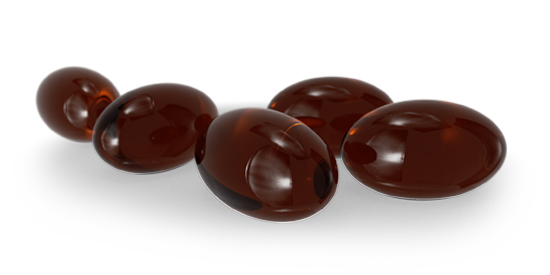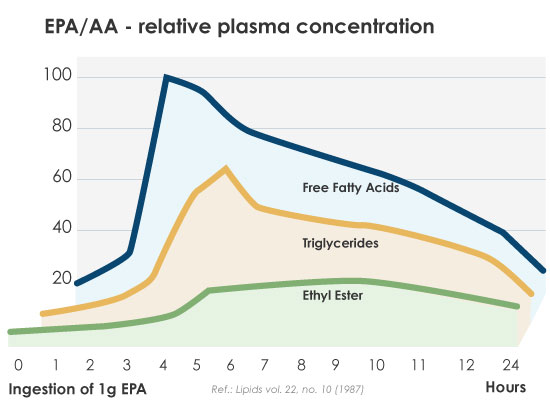Pure concentrated fish oil with vitamin B
- With free fatty acids that provide 50% better absorption
- The fish oil contains 65% omega-3 fatty acids
- Combined with vitamins B12 and folic acid that support a normal homocysteine metabolism
- The fish oil is carefully purified to remove pesticides, heavy metals, dioxins, and other toxic substances
- This fish oil product meets or exceeds all EU regulatory requirements for purity
- A soft gelatin capsule that is relatively small and easy to swallow
- Produced under strict pharmaceutical control
- Scientifically documented
| 1 capsule contains: | %RDA* | ||
|---|---|---|---|
| 1) Fish oil (free fatty acids) | 500 mg | ||
| Omega-3 fatty acids | 325 mg | ||
| Including: EPA (eicosapentaenoic acid) | 185 mg | ||
| DHA (docosahexaenoic acid) | 115 mg | ||
| Each capsule contains 300 mg of EPA + DHA, | |||
| - sufficient for obtaining a beneficial effect | |||
| 2) Vitamin B9 (folic acid) | 100 µg | 50% | |
| Vitamin B12 (cyanocobalamin) | 1 µg | 40% |
* RDA: Recommended Daily Allowance
1) Good for the blood pressure: Suggested dosage: 10 capsules (3 grams of EPA+DHA) per day. Do not take more than 5 grams per day (17 capsules).
2) Good for memory and mental balance.
Product Facts
Directions
1 capsule a day, unless advised otherwise. Preferably take together with/after a meal.
The capsules should be swallowed whole, not chewed or divided.
Do not exceed the recommended daily dosage.
Dietary supplements should not replace a varied diet.
A healthy lifestyle and a varied diet are important for maintaining good health.
Ingredients
Fish Oil Fatty Acids (in free form),
capsule shell: gelatin,
humectant: glycerol, purified water,
thickening agent: silicon dioxide,
color: cocoa,
folic acid: pteroylmonoglutamic acid,
vitamin B12: cyanocobalamin.
Storage
Dark, dry and at room temperature.
Keep out of reach of young children.
What is Bio-Marine (Plus)?
 Bio-Marine Plus is a fish oil supplement with soft gelatin capsules that each contain 500 mg of fish oil, including 185 mg of EPA, 115 mg of DHA, and 25 mg of other omega-3 fatty acids. The omega-3 content is predominantly in the form of easily absorbed free fatty acids. The fish oil is concentrated and provides a fairly large quantity of omega-3 in relatively small capsules. The fish oil is highly refined which means it has been purified by means of a special process that guarantees a fish oil that is way below the official threshold levels for environmental pollutants. The fish oil in Bio-Marine Plus is derived from wild free-range fish, not from farmed aquaculture fish. Bio-Marine Plus is encapsulated in an oxygen-free environment and has an extremely low peroxide value. The oil in the capsules is effectively protected against oxidation. Two homocysteine-lowering B vitamins, folic acid and vitamin B12, have been added to Bio-Marine Plus.
Bio-Marine Plus is a fish oil supplement with soft gelatin capsules that each contain 500 mg of fish oil, including 185 mg of EPA, 115 mg of DHA, and 25 mg of other omega-3 fatty acids. The omega-3 content is predominantly in the form of easily absorbed free fatty acids. The fish oil is concentrated and provides a fairly large quantity of omega-3 in relatively small capsules. The fish oil is highly refined which means it has been purified by means of a special process that guarantees a fish oil that is way below the official threshold levels for environmental pollutants. The fish oil in Bio-Marine Plus is derived from wild free-range fish, not from farmed aquaculture fish. Bio-Marine Plus is encapsulated in an oxygen-free environment and has an extremely low peroxide value. The oil in the capsules is effectively protected against oxidation. Two homocysteine-lowering B vitamins, folic acid and vitamin B12, have been added to Bio-Marine Plus.
Free fatty acids in Bio-Marine Plus
In nature, omega-3 fatty acids occur in their triglyceride form and must be decomposed and broken down into “free” fatty acids before the digestive tract is able to absorb them. This process is handled by a digestive enzyme called lipase. Bio-Marine Plus predominantly contains omega-3 in the form of free fatty acids that are ready for absorption. This is an advantage for individuals with impaired lipid absorption.
Free fatty acids may cause a burning sensation on the tongue if you chew the capsule. It is therefore recommended to swallow the capsule whole. The concentrated blend of free fatty acids and added B vitamins may also result in an odor from the oil, but this does not have any effect on the oil and its quality. It is fresh and clean and with a very low peroxide value.
Bio-Marin Plus is a good supplement for those who for various reasons do not eat fish in the amounts recommended by health authorities, and for those who want a highly purified and clean fish oil supplement that is easy to absorb
What does ”Plus” stand for?
Besides omega-3 fatty acids, Bio-Marine Plus contains folic acid and vitamin B12. Both vitamins contribute to a normal homocysteine metabolism. Also, folic acid contributes to a normal immune system, normal psychological functions, and normal blood formation. Furthermore, folic acid has a role in the process of cell division and supports normal fetal tissue growth during pregnancy.
What are omega-3 fatty acids?
Omega 3 fatty acids is a group of essential, polyunsaturated fatty acids that are primarily found in fish, namely oily fish like herring, salmon, and mackerel. The two most important Omega 3 fatty acids are eicosapentaenoic acid (EPA) and docosahexaenoic acid (DHA).
Way back in the late 1970’s two Danish doctors, Bang and Dyerberg, demonstrated why Greenland Eskimos, because of their large consumption of fish and sea mammals, generally had better health than the Danish population*. If you don’t eat fish it may be an advantage to take a supplement of Omega 3 fatty acids to ensure a sufficient intake of these beneficial compounds. In fact, it is ideal if a diet provides the right balance between Omega 3 and Omega 6 (a group of fatty acids found in plants). Experts believe it is ideal to ingest Omega 3 and Omega 6 in a 1:4 ratio.
* Bang HO, et al. Acta Med Scand 1976;200:69-73.
Dyerberg J, et al. Lancet 1978 Jul 15;2(8081):117-9
Good for heart, brain, and eyesight
EPA and DHA have several positive benefits. For instance, a 200 mg per day intake of DHA contributes to normal development of the brain, and the eyes of the foetus and breastfed infants. In adults, 250 mg of DHA each day contributes to the maintenance of normal brain and vision. In addition, 250 mg of DHA and EPA per day contributes to normal function of the heart.
The mentioned levels correspond with 2 (200mg) and 3 (250mg) Bio-Marine capsules daily.
Why free fatty acids?
Fish oil must first be converted into free fatty acids before is absorbable. This conversion results in some loss of fatty acids. When you take fish oil as free fatty acids, you get 50% better absorption. This allows you to achieve the same effect with less capsules
Good for heart and blood vessels, for a healthy cholesterol level, and flexible joints.
Optimal purity and bioavailability
The fish oil in Bio-Marine Plus is highly refined in order to guarantee a high level of purity. The oil has been thoroughly cleansed in a three-step purification and refining process. One of the world’s leading technologies is used to screen the oil and remove naturally occuring but unwanted particles such as pesticides, heavy metals, furans (highly toxic waste particles from industrial burning), etc. Because of this treatment, the content of several of these compounds is far below the official threshold levels that have been approved for fresh fish and fish oil products.
Bio-Marine Plus' high level of purity was confirmed in a survey from 2019* that compared levels of pollutants in different fish oil products at the request of the independent Danish consumer organization TÆNK. The study found the following low pollution values in Bio-Marine Plus:
- Mercury (Hg): minimum 95% below the EU permitted content of mercury.
- Dioxin: 98% below the EU allowed limit on dioxin and dioxin-like PCBs.
* Ref. TÆNK, February 2019.
Fatty acids bioavilability
Bio-Marine Plus contains omega-3 fatty acids in their free form that are assimilated and utilized significantly better by the body compared with both triglycerides and ethyl esters that are used in other fish oil products.
Bio-Marine Plus – highlights
- A Finnish study that is published in a scientific journal* demonstrated that daily consumption of Bio-Marine daily offered the same measurable health benefit as eating a fish meal four to five times weekly.
- Bio-Marine Plus contains 500 mg of concentrated fish oil in each capsule with an omega-3 content of 65% (38% EPA, 22% DHA, and 5 % other omega-3 fatty acids.)
- Bio-Marine Plus is encapsulated in an oxygen-free environment and has an extremely low peroxide count due to the fact that the oil is effectively protected against oxidation (rancidity)
*) J. Agren et al. 1996; Eur. Journal of Clinical Nutrition 50;765-71.
Variations in gelatin hardness
The hardness of our soft gelatin capsules can vary. The difference depends solely on the water content of the capsule shell. We dry all our soft capsules before packaging, which makes the capsules firmer and facilitates the packaging process itself. Over time, the capsules can absorb water from the air, and this will soften the capsule shell.
The variations in the hardness of the capsule have no effect on the product quality, but if a hard capsule is a problem, a solution may be to leave the capsule outside the blister sheet for a day, whereby the capsule can absorb a little water from the air. This is generally not something we recommend, as the product will no longer be protected as when it is in the blister sheet. Another method of quickly softening the gelatin capsule is to place it in lukewarm water for one minute. However, it should be seen as an emergency solution.
Official claims
 The European Food Safety Authority (EFSA) has evaluated the evidence behind essential omega 3 fatty acids, folic acid, and vitamin B12 and has acknowledged the following claims:
The European Food Safety Authority (EFSA) has evaluated the evidence behind essential omega 3 fatty acids, folic acid, and vitamin B12 and has acknowledged the following claims:
- EPA* and DHA* contribute to normal heart function
* Min. 250 mg of EPA / DHA per day - DHA* helps to maintain normal vision
* Min. 250 mg of DHA per day - DHA* contributes to the maintenance of normal brain function
* Min. 250 mg of DHA per day - Intake of docosahexaenoic acid (DHA) contributes to normal development of vision in infants up to 12 months of age* (Art. 14)
* The beneficial effect is obtained with a daily intake of 100 mg of DHA - Maternal DHA intake of DHA contributes to normal development of the brain of the foetus and breastfed infants ** (Art. 14)
** Info to pregnant and lactating woman: The beneficial effect is obtained with a daily intake of 200 mg of DHA in addition to the recommended daily intake of omega-3 fatty acids for adults, i.e., 250 mg of DHA and eicosapentaenoic acid (EPA). The claim can be used only for food which provides a daily intake of at least 200 mg of DHA - Maternal intake of docosahexaenoic acid (DHA) contributes to normal brain development in the fetus and infants that are breastfed *** (Art. 14)
*** Info to pregnant and lactating woman: The beneficial effect is obtained with a daily intake of 200 mg of DHA in addition to the recommended daily intake for omega-3 fatty acids for adults, i.e.,: 250 mg of DHA and eicosapentaenoic acid (EPA). The claim can be used only for food which provides a daily intake of at least 200 mg of DHA - Folic acid and vitamin B12 contribute to normal homocysteine metabolism
- Folic acid contributes to normal maternal tissue growth during pregnancy
- Folic acid contributes to normal amino acid synthesis
- Folic acid contributes to normal blood formation
- Folic acid contributes to normal psychological functioning
- Folic acid and vitamin B12 contribute to normal functioning of the immune system
- Folic acid and vitamin B12 contribute to the reduction of tiredness and fatigue
- Folic acid and vitamin B12 have a role in the process of cell division
- Vitamin B12 contributes to normal energy-yielding metabolism
- Vitamin B 12 contributes to normal functioning of the nervous system
- Vitamin B12 contributes to normal psychological functioning
- Vitamin B12 contributes to normal red blood cell formation


